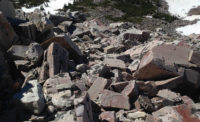In 2017, 5,147 workers in the U.S. were killed on the job, according to the U.S. Bureau of Labor Statistics, down slightly from 5.190 in 2016. The fatal injury rate in 2017 was 3.5 per 100,000 full-time employees. Three or four people out of 100,000. Not close to one percent. Meaning most everyone escapes being touched by a work-related death.
Still, this coming April 28th, which falls on a Sunday, will be a day of remembrance for those thousands killed on the job, as well as the many thousands more disabled, injured or sickened while working. The AFL-CIO started Workers’ Memorial Day in 1970. In Canada, it is an official Workers’ Day of Mourning. April 28th is recognized as a national day in countries worldwide, everywhere from Bermuda and Brazil to Luxembourg and Peru.
Easy come, easy go
The day comes and goes and most of us don’t give it a thought. No one wants to focus on death; it’s human nature to evade the dreaded subject as long as possible. And for families who do struggle with death’s consequences as a result of an “accident,” it’s of little solace that there is a “national” or “officially-recognized” day with rallies and parades around the world. Yes, the day does honor their loss, and for people like Ron Hayes, who lost his 19-year-old son Patrick buried alive in a grain silo “accident,” it is an important tribute. Still, Ron says 25 years later he has more questions than answers. That’s part of mourning. The questions never get answered.
But most of us – more than 99.9 percent – don’t ask the questions: Why did it happened? How could have it been prevented? What can be done so it doesn’t happen again, to someone else? Yes, most U.S. companies will conduct incident investigations to get at those root causes of why “the incident” occurred and what can be done to prevent it from occurring again. Fed OSHA or the states will investigate, too. But it is work most often done by professionals removed from the grief and suffering. Something like coroners performing autopsies. And what happens to most of those investigative conclusions? Some are acted on; many are filed away and forgotten. Until the next “incident” energizes another journey to discovery.
Becoming born-again
Every death on the job, rare as it is, does touch others not in the immediate family. Or at least most do. More than one manager forced to make “that call” to the spouse or parent of one killed at work has vowed publicly, “I never want to have to do that again.” It’s harrowing to be that close to death, to hear the cries of shock. Many become born-again safety advocates.
There will be a handful of co-workers who gather around their unconscious buddy in an ICU unit, hooked up to tubes and machines. Maybe he fell off a ladder. Slipped on a spill and hit his head on a concrete loading dock. Got caught in an auger. They take turns talking to him or her, though they can’t be heard. “Everything was going along as usual, and then all hell broke loose.” Will these co-workers ever be the same? Will they ever feel as safe? Will some experience post-traumatic stress?
The shaken manager who makes “that call.” The co-workers who witnessed the “accident.” Many will play and replay the “what if” game. The senior leader: What if I had invested more in safety? Would have this happened? What if I had asked more questions? Where is the next injury going to happen, and why? The co-workers: What if I had told him to move off that top step of the ladder? What if I had gone and placed a warning cone next to that spill?
Most of us never play the “what if” game. Those BLS numbers are but statistics, akin to reading about a fatal bus crash or earthquake. It happened somewhere else, to people I don’t know. Back to human nature. None of us want to dwell on death. That’s morbid. We don’t want to think about it until the next funeral comes around. So we just get on with our lives.
Quickly moving on
This can frustrate those in mourning, like Ron. Like the more than 900 families Ron has helped in their time of grieving. There’s the “accident,” the funeral service, the flowers and sympathy cards, the investigation, and then people move on. April 28th comes and goes and we move on, quickly. Life moves fast. Until it doesn’t. Until shockingly a husband, wife, mother, father, son or daughter don’t come home from work. Time stops. The world is never the same.
But 99.9 percent of us won’t experience that shock, those emotions. If we even came close to that raw pain, we’d actively care, to quote Dr. Scott Geller. Worker safety wouldn’t be trivialized as it is in many companies. There would be far more true cultures of safety. More best practices. Fewer fatalities. But we mostly react to death, to “incidents.” We don’t anticipate and plan for them. It’s not our nature. “It’ll happen to someone else, not me.” Human instinct stifles safety. Denies its negative consequences. The thought and feelings behind April 28th need to be expressed and acted on every day. Not just when you hear someone knocking on heaven’s door.
— Dave Johnson, ISHN Editor, johnsond@bnpmedia.com







